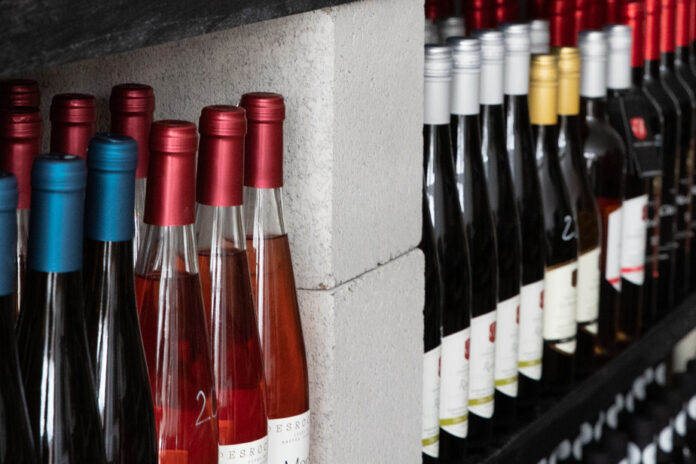From December 1, Quebec winegrowers must remit to the Société des alcools du Québec (SAQ) an amount equivalent to 40.3% of the price of the bottles they sell in grocery stores, in order to settle a commercial dispute with Australia . Winegrowers and delicatessen owners accuse Quebec, which had promised aid in 2021, of dragging its feet.
The financial drain is considerable for winegrowers who sell their products in grocery stores, underlines Sébastien Daoust, owner of the Les Vignes Des Bacchantes vineyard, located in Hemmingford, in Montérégie.
Delicatessens represent 40% of its sales volume. “It’s certain that if, overnight, we eat half of the margins we make, it will have a huge impact,” replies the entrepreneur who also teaches at HEC Montréal.
With this tax, it is simply impossible for a winegrower to make a profit, adds Fred Tremblay, of Vignoble Camy in Saint-Bernard-de-Lacolle. In response, his company simply stopped selling its wines to grocers and focused on restaurateurs. “You have to give 40% of the sale price to the SAQ. It’s clear that we don’t make 50% profit on the products we sell. If I give 40%, I’m significantly in the deficit. »
The measure was announced in spring 2021 to resolve a trade dispute with Australia. The country argued that local Quebec producers benefited from a competitive advantage by selling their bottles directly in grocery stores.
Quebec “held its ground”, but it had no choice in giving up in 2021 when the other provinces found an agreement, says the president of the Conseil des vins du Québec (CVQ), Louis Denault. “We knew we were a bit wrong,” he admits. We managed to maintain direct access to grocery stores, but we agreed to pay a premium. »
The fact remains that Vignoble Camy obtains nothing for this payment, denounces Mr. Tremblay. “In return, the SAQ does nothing. They don’t make deliveries. They do absolutely none of that. We have to do the same work, then all of a sudden we have 40% less income. »
Nearly 31% of bottles of Quebec wine were sold in grocery stores in 2022, according to the most recent report from the CVQ. This proportion has been growing since the practice was authorized in December 2016.
Delicatessen owners are also worried about the effects the increase will have on their business. At a time when inflation is eating into household wallets, Pascale Rémond, co-founder of the delicatessen Les Minettes in Laval, does not see how it would be possible to pass the bill on to consumers.
“It is certain that customers will no longer want to buy wines with a 40% increase on the price of the bottle,” she answers. Without government assistance, it is certain that there will be no more Quebec wine on our shelves. »
Les Minettes will continue to sell Quebec wines at the same price during the crucial holiday period, because the store specializing in Quebec food products has stocked up before the December 1 deadline. In the medium term, the increase casts a shadow over the future of the company. “It represents 50% of the store’s sales. »
The entrepreneurs interviewed by The Canadian Press are eager to know if the Legault government will help them absorb the blow.
When the increase was announced in spring 2021, the Minister of the Economy, Pierre Fitzgibbon, promised to find a way “to limit the negative effects as much as possible. »
More than two years have passed since then. Mr. Denault had pleaded with the government so that the terms of this support were known six months before the increase came into force.
“We greatly feared what is happening now,” confides the president of the CVQ, who is also the owner-winemaker of Vignoble Sainte-Pétronille on Île d’Orléans. The government’s inefficiency in this matter is atrocious. »
At the Ministry of the Economy, we want to collaborate with the industry to guarantee its competitiveness and limit a potential increase in prices for consumers. “Discussions are continuing in order to translate this openness of the government into new gestures which will meet the expectations of the community,” responds its spokesperson Jean-Pierre d’Auteuil.
Rather than financial assistance, the Canadian Federation of Independent Business (CFIB) believes that the increase should simply be abolished. If restrictions were not imposed on foreign wines, Quebec winegrowers would also be exempt without contravening international trade rules.
“We are very good in Quebec at putting too much tax and, after that, trying to point in other directions rather than finding the fundamental problem which is overtaxation,” denounces its vice-president for Quebec, François Vincent.
While waiting for government intervention, Paul Jodin’s company, from Vignoble Saint-Gabriel in the Lanaudière region, continues to deliver bottles to grocers for the holiday season, but its owner wants to proceed with caution. “We will have to “break a little”, as we say in French, because we don’t know if there will be compensation. Then, the compensation on the 40%, are they going to give us 15%, 20%? »
Some winegrowers find that communication is deficient on the part of the SAQ and the government.
Members of the CVQ received information “this week” through their association which acts as a bridge between the state company and winegrowers, the SAQ explains.
Details on the declarations to be completed will be sent in mid-December. The form will be “simple” and “complete,” assures the spokesperson for the state corporation, Linda Bouchard. “There’s no point on anyone’s part to make it complicated. »
The fact remains that some winegrowers who are not members of the CVQ are in the dark, notes Ms. Rémond. “On Wednesday again (two days before the increase came into force), I spoke to a winegrower who had heard about it, but there was no communication to this effect because he did not is not a member,” says the entrepreneur who is involved in the association.





